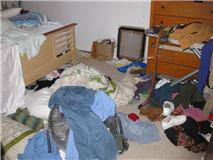I don’t think anyone would disagree: Clutter is annoying. It’s a nuisance to look at. It’s frustrating and obnoxiously unpleasant. The general unpleasantry, however, is more than just annoying. It’s proven to have several negative health impacts: physically, mentally, emotionally and environmentally.
Here’s a closer look at how clutter affects your health and suggestions on how to combat it.
1. How Clutter Affects Your Health – Physically
In his books, Does This Clutter Make My Butt Look Fat and Lose the Clutter, Lose the Weight, Peter Walsh makes a strong case for how an excess of stuff has a direct relationship to an excess of pounds. (More junk = more junk in the trunk).
All jokes aside, there are many complex factors playing a role, such as stress and behavioral issues, but the solutions can start simply. Organizing your fridge/pantry and planning meals not only helps to eliminate clutter, but also helps get you on track to healthier eating habits.
2. How Clutter Affects Your Health – Mentally
Just being around clutter can cause an uprise in anxiety. For people already struggling with mental health issues, such as anxiety and depression, clutter can be a trigger that has a huge impact on a person’s state of mind. Clearing your space of clutter can literally help to clear your mind, calm you down and give you sense of control over your space.
Start small. Clear one room of your home, and make that your oasis. When you’re feeling anxious or sad, go into that space, take a few deep breaths and be aware of how your body and mind react.
3. How Clutter Affects Your Health – Emotionally
Clutter is the result of behaviors, and those behaviors can be the result of emotions such as fear or anger. They can also be the source of emotions such as guilt or shame. Getting to the bottom of those emotions can make a huge difference in getting to the bottom of your clutter – literally.
Do you have a fear of losing things, difficultly letting go or an excessive need to hold on to the past? The clutter that surrounds you not only feeds into these emotions, but creates a vicious cycle of negative emotions (fear of letting go)…leading to more clutter…leading to more negative emotions (guilt and shame about the clutter).
Journaling can be a good way to sort out these emotions. Make a list of all the stuff you have that falls into the clutter category. Note why you have it, how it makes you feel, how you would feel if it was gone, and possible solutions (donation, giving to a family member, selling, burning those photos of your ex, etc.) Make a goal with a timeline, like getting rid of 1 item a week for the next 2 months. Taking it one item at a time will help soften the impact emotionally. Just burn the pictures, and move on with your life!
4. How Clutter Affects Your Health – Environmentally
Don’t take this lightly. Clutter can be downright dangerous. Not only can an excess of stuff be a fire hazard, but you might not notice the other offenders, including mold, dust mites, animal dander and evidence of other infestations (mouse poop.) Yeah, I said it. Crap. In. Your. Crap. If that’s not enough to get you started sorting through your clutter, then maybe it’s time to seek professional help.
For More Help, Contact Can The Clutter!
At Can the Clutter, our organizers help you not only decide what to keep and what not to keep, but we help you through the process of letting go. Being at peace in your space is our goal for each and every client. When it comes to your health, getting organized might just be the medicine you’ve been looking for.




